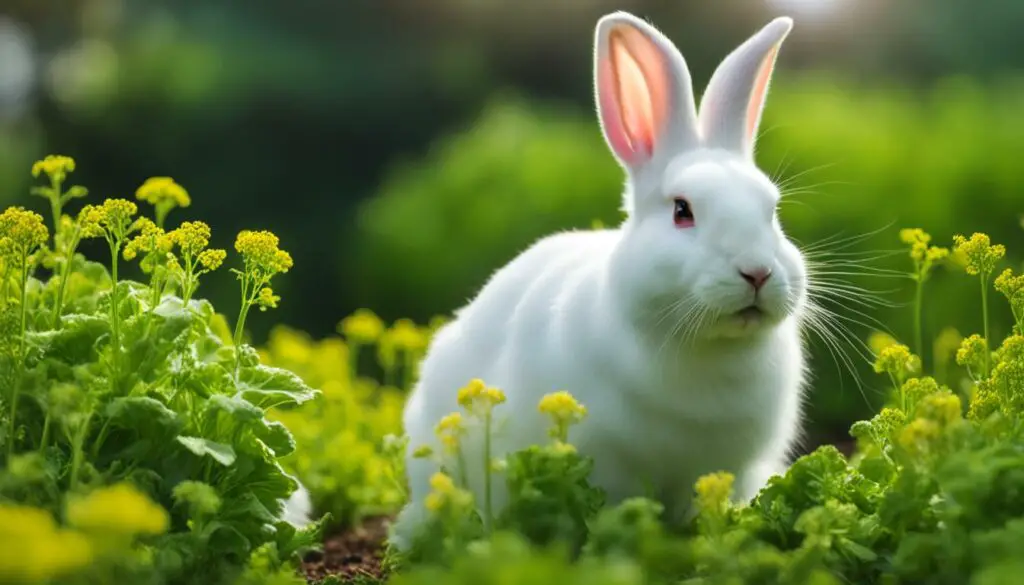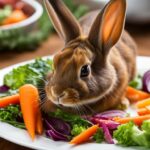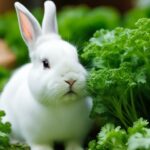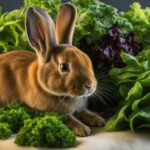Rabbits in the wild consume a variety of plants, including grasses, leaves, bark, twigs, fruits, and seeds. When it comes to a healthy diet for house rabbits, the majority should consist of grass hay. Mustard greens are safe for rabbits to eat and can be incorporated into their diet as part of the fresh foods portion. However, it’s important to provide a balanced diet that includes hay, fresh greens, a little fruit, and a few pellets.
Key Takeaways:
- Mustard greens are safe for rabbits to eat and can be included in their diet as part of the fresh food portion.
- Rabbits should have a balanced diet that includes hay, fresh greens, a little fruit, and a few pellets.
- Grass hay should make up the majority of a rabbit’s diet, as it is rich in essential nutrients.
- Other rabbit-friendly greens include parsley, spinach, beet greens, Swiss chard, and radish tops.
- It’s important to monitor the amount of high oxalate vegetables like mustard greens, parsley, and spinach to prevent any adverse effects.
The Importance of Hay in a Rabbit’s Diet
Hay is a crucial component of a rabbit’s diet. It provides essential nutrients, promotes healthy teeth, and maintains a healthy gastrointestinal tract. Grass hay, such as timothy, orchard, and oat hay, should make up the majority of a rabbit’s diet. Avoid feeding alfalfa hay, as it is higher in calories and protein. Mustard greens can be included as part of the fresh greens portion of a rabbit’s diet, providing additional nutrients and moisture. Other rabbit-friendly greens include parsley, spinach, beet greens, Swiss chard, and radish tops.
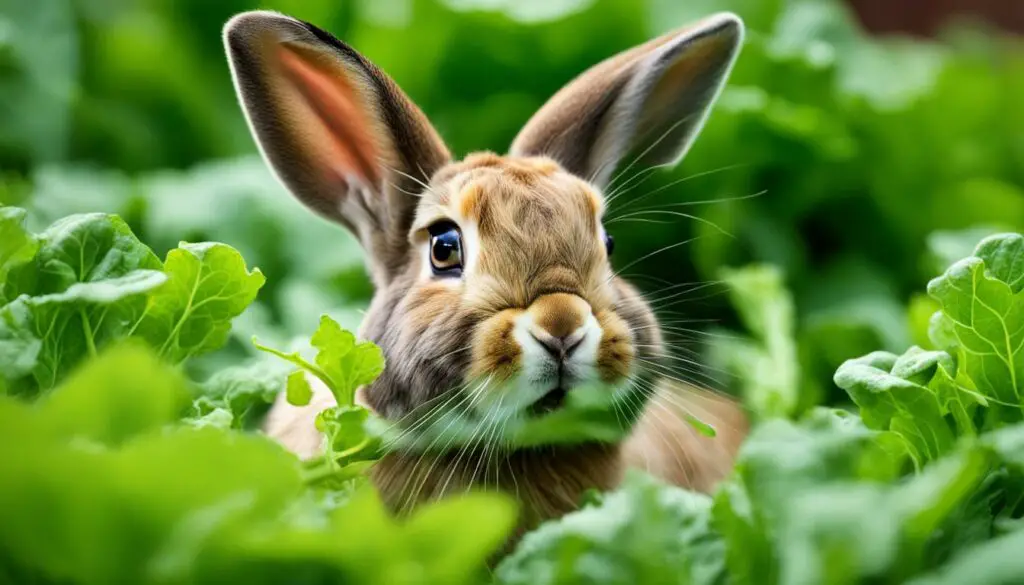
Table: Comparison of Rabbit-Friendly Greens
| Greens | Nutritional Benefits |
|---|---|
| Mustard Greens | Rich in vitamins A, C, and K, calcium, and fiber |
| Parsley | High in vitamins A and C, iron, and antioxidants |
| Spinach | Good source of iron, calcium, and vitamins A and C |
| Beet Greens | Contains vitamins A, C, and K, iron, and magnesium |
| Swiss Chard | High in vitamins A, C, and K, and fiber |
| Radish Tops | Rich in vitamins A, C, and K, and calcium |
Incorporating hay and a variety of rabbit-friendly greens into a rabbit’s diet is essential for their overall health and well-being. It is important to provide a balanced diet that meets their nutritional needs and promotes proper digestion.
Fresh Foods for a Rabbit’s Diet
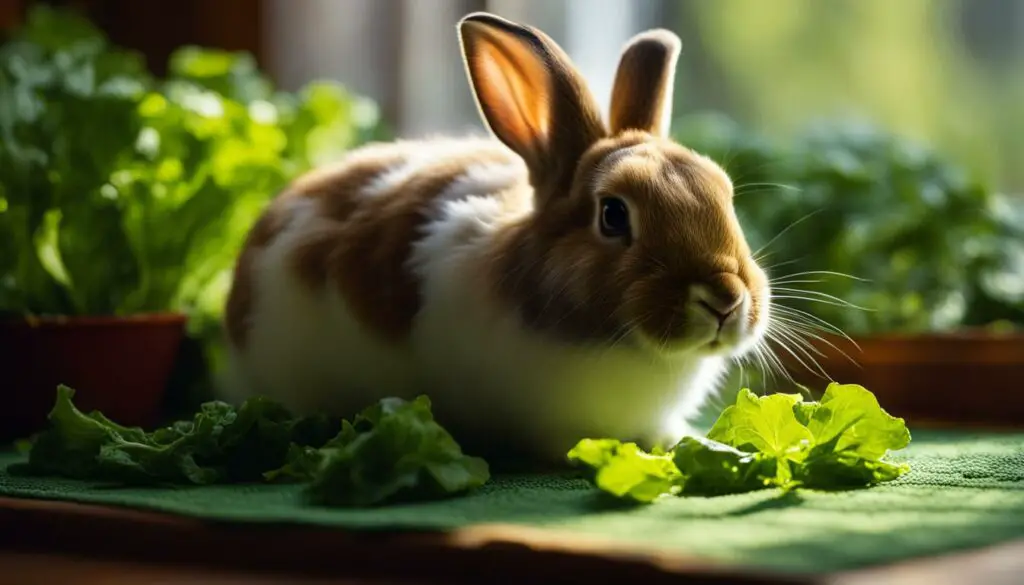
Fresh foods play a crucial role in a rabbit’s diet, providing additional nutrients, textures, and tastes. Leafy greens should make up about 75% of the fresh portion of a rabbit’s diet, offering a wide variety of options for nutrition and variety. Mustard greens can be included in the rotation of leafy greens, along with other choices like kale, dandelion greens, and lettuce varieties.
When incorporating fresh foods, it is recommended to feed approximately 1 cup of greens for every 2 pounds of rabbit body weight once a day or divided into multiple feedings. This ensures that rabbits receive a balanced diet and maintain a healthy weight. It is important to introduce new foods gradually and monitor the rabbit’s digestion for any signs of diarrhea or other adverse reactions.
Table: Nutritional Comparison of Rabbit-Friendly Greens
| Mustard Greens | Kale | Dandelion Greens | Lettuce Varieties | |
|---|---|---|---|---|
| Vitamin A | + | ++ | + | + |
| Vitamin C | + | + | + | + |
| Calcium | + | + | + | + |
| Iron | + | + | + | + |
By offering a variety of leafy greens, rabbits will receive a range of essential vitamins and minerals. Each green has its nutritional benefits, and incorporating a combination of these options ensures rabbits receive a balanced and healthy diet.
Safe Vegetables for Rabbits
When it comes to feeding rabbits, it’s important to provide a variety of safe vegetables to ensure a balanced diet. Vegetables not only provide essential nutrients but also add variety and enrichment to the rabbit’s meals. Here are some rabbit-friendly greens that you can include in your furry friend’s diet:
- Carrots
- Broccoli
- Edible flowers
- Celery
- Bell peppers
- Chinese pea pods
- Brussel sprouts
- Cabbage
- Squash
These vegetables can be fed to rabbits in moderation, making up no more than 15% of their overall diet. It’s important to remember that rabbits have sensitive digestive systems, so it’s crucial to introduce new vegetables gradually and monitor their response. Too many vegetables or introducing them too quickly can lead to digestive upset.
By providing a variety of safe vegetables, you can ensure that your rabbit’s diet is nutritious and enjoyable. Remember to consult with a veterinarian to determine the appropriate portion sizes and diet plan for your furry friend.
| Vegetable | Portion Size | Feeding Frequency |
|---|---|---|
| Carrots | 1-2 baby carrots | 2-3 times per week |
| Broccoli | 1-2 small florets | 2-3 times per week |
| Edible flowers | A small handful | 1-2 times per week |
| Celery | 1-2 small stalks | 1-2 times per week |
| Bell peppers | 1-2 slices | 2-3 times per week |
| Chinese pea pods | 2-3 pods | 1-2 times per week |
| Brussel sprouts | 1-2 sprouts | 1-2 times per week |
| Cabbage | 1-2 small leaves | 2-3 times per week |
| Squash | 1-2 small slices | 2-3 times per week |
The Health Benefits of Mustard Greens for Rabbits
As a rabbit owner, you may be wondering about the health benefits of including mustard greens in your furry friend’s diet. Well, you’ll be happy to know that mustard greens are indeed a rabbit-friendly green that can offer a variety of benefits. These nutritious greens are packed with vitamins A, K, and C, as well as minerals like calcium and potassium. They also provide a good amount of fiber, which promotes healthy digestion in rabbits. Including mustard greens in your rabbit’s diet can help support their overall health and well-being.
To highlight the specific health benefits of mustard greens for rabbits, let’s take a closer look at the key nutrients they contain:
| Nutrient | Benefits |
|---|---|
| Vitamin A | Promotes good vision and supports a healthy immune system |
| Vitamin K | Plays a vital role in blood clotting and bone health |
| Vitamin C | Acts as an antioxidant and supports immune system function |
| Calcium | Essential for strong bones and teeth |
| Potassium | Helps maintain the proper functioning of the heart, muscles, and nerves |
By incorporating mustard greens into your rabbit’s diet, you can provide them with these valuable nutrients that contribute to their overall well-being. However, it’s important to remember that mustard greens should be part of a balanced diet that includes other fresh greens, hay, and a small amount of pellets. Variety is key when it comes to feeding rabbits, so be sure to offer a diverse range of rabbit-friendly greens to ensure your furry friend gets all the nutrients they need.
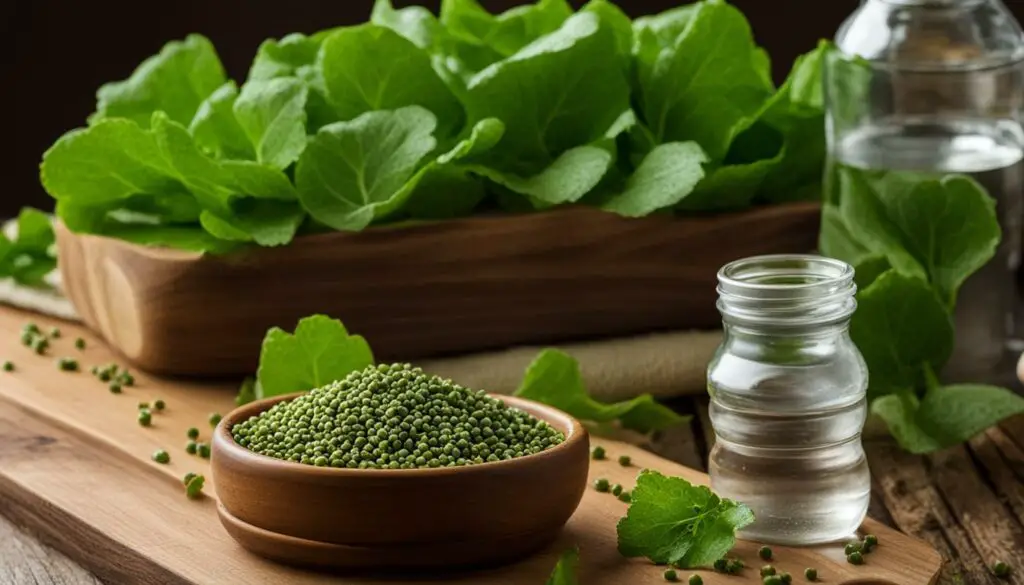
In conclusion, mustard greens are a valuable addition to a rabbit’s diet due to their numerous health benefits. Just remember to introduce them gradually and monitor your rabbit’s response to ensure they tolerate the greens well. By providing your bunny with a varied and nutritious diet, you can help them live a happy and healthy life.
Alkaloids and Oxalic Acid in Rabbit Diets
When it comes to feeding rabbits, it’s important to be aware of certain compounds that can be found in their diet. Two such compounds are alkaloids and oxalic acid. Alkaloids are mild toxins that protect plants in the wild, while oxalic acid is found in varying levels in certain vegetables.
Alkaloids and oxalic acid, although present in some rabbit-friendly greens like parsley, mustard greens, and spinach, can have potential negative effects on rabbits’ health if consumed in large quantities. These compounds can cause tingling sensations in the skin and mouth, as well as potential kidney damage.
It’s crucial to note that most fresh vegetables fed to rabbits have low levels of oxalic acid and are safe to eat. However, it’s always recommended to provide a variety of leafy greens and not rely solely on high oxalate foods in order to minimize the risks. Furthermore, it’s important to remember that rabbits make their own vitamin C and do not rely on fruits or vegetables for this nutrient.
To ensure a balanced diet for your rabbit, it’s best to consult with a veterinarian who can provide specific guidance based on your rabbit’s individual needs and health. By incorporating a variety of safe vegetables and monitoring their intake, you can help keep your furry friend healthy and thriving.
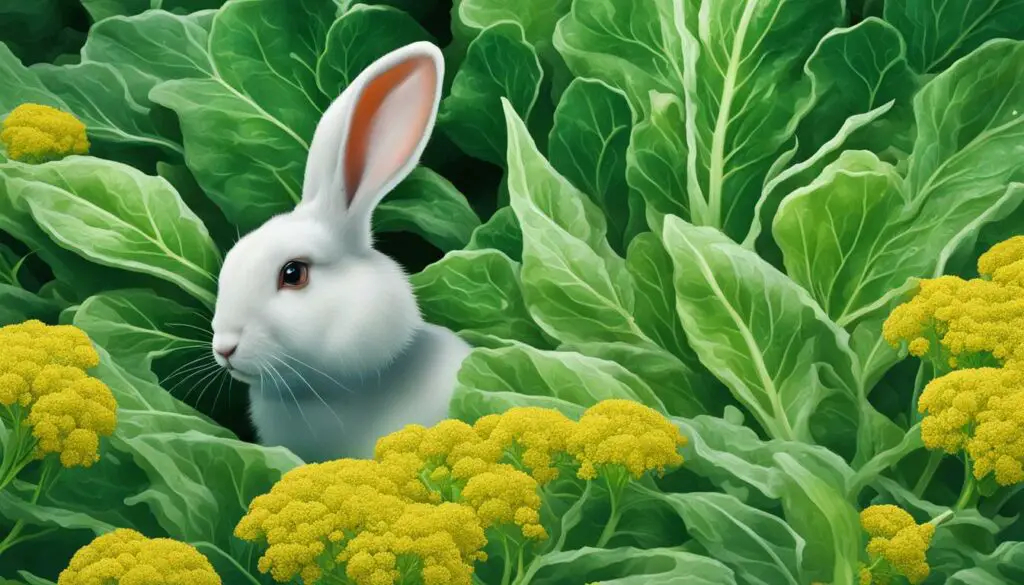
Table: Vegetables with High Levels of Oxalic Acid
| Vegetable | Oxalic Acid Level |
|---|---|
| Parsley | High |
| Mustard Greens | Medium |
| Spinach | Medium-High |
Concerns About Gas and Goitrogenic Foods
When it comes to the diet of pet rabbits, there are often concerns about certain foods causing gastrointestinal gas. However, it’s important to note that a rabbit’s digestive system is different from that of humans. While some vegetables may cause gas in humans, many of these same foods do not have the same effect on rabbits. Gas-inducing foods for humans, such as broccoli, do not typically cause gas in rabbits.
Additionally, there is some discussion about goitrogenic foods, such as broccoli and cabbage, possibly causing goiter in rabbits. However, research suggests that it would take a prolonged period of exclusively feeding large quantities of these foods to see any abnormalities. In general, it is safe to feed these nutritious foods to rabbits in moderate amounts.
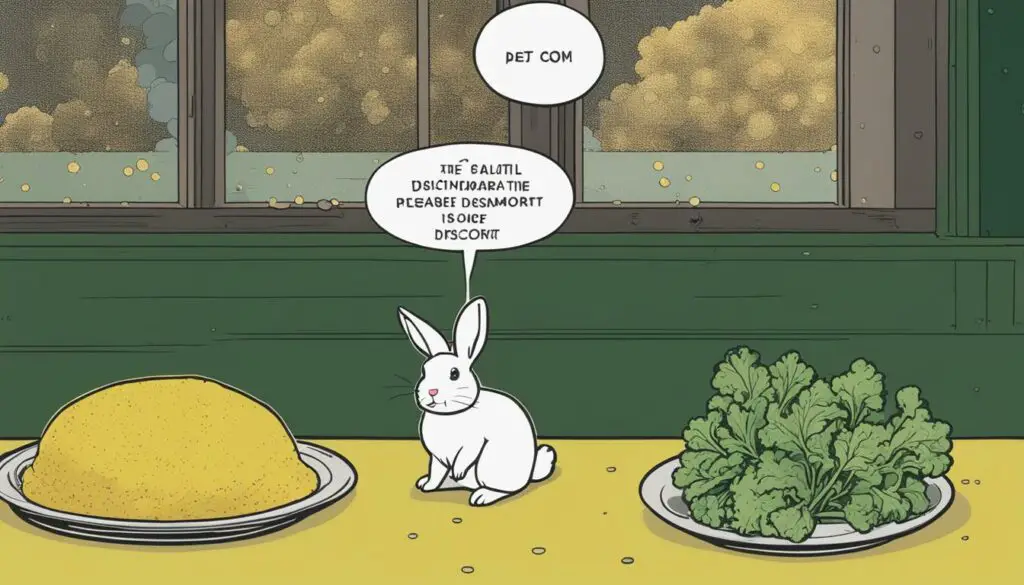
Gas and Goitrogenic Foods in Rabbit’s Diet: Myths and Facts
Myth: Gas-inducing foods for humans, like broccoli, cause gas in rabbits.
Fact: A rabbit’s digestive system is different, and these foods typically do not cause gas in rabbits.
Myth: Goitrogenic foods, such as broccoli and cabbage, cause goiter in rabbits.
Fact: Feeding these foods in moderate amounts does not typically lead to goiter in rabbits.
In conclusion, it is generally safe to include gas-inducing and goitrogenic foods in a rabbit’s diet in moderation. Monitoring the rabbit’s overall health and digestive well-being is important, and any signs of discomfort or abnormal behavior should be brought to the attention of a veterinarian. A varied diet that includes a range of safe vegetables, along with grass hay as the foundation, can contribute to a healthy and balanced diet for your pet rabbit.
Vegetable and Pellet Recommendations
Feeding rabbits a balanced diet that includes a variety of vegetables and pellets is essential for their overall health and well-being. Vegetables should make up a significant portion of a rabbit’s diet, along with hay and a few pellets. Leafy greens, such as lettuce, arugula, turnip greens, and dandelion greens, should comprise about 75% of the fresh portion of the diet. Non-leafy vegetables like bell peppers, cucumbers, broccoli, and cabbage can be fed in smaller quantities.
When selecting vegetables for your rabbit, it’s important to introduce new foods gradually and monitor their digestion for any signs of diarrhea. Each rabbit may have individual health factors that need to be considered when choosing greens and veggies. It’s also important to provide a fresh, high-quality pellet that meets the nutritional needs of your rabbit. Pellets should be limited in quantity to prevent obesity and nutrient imbalances.
Here is a table summarizing the recommended feeding guidelines for vegetables and pellets:
| Food | Recommended Portion |
|---|---|
| Leafy greens | About 75% of the fresh portion of the diet |
| Non-leafy vegetables | No more than 15% of the diet |
| Pellets | Regulated amount based on the weight of the rabbit |
By following these recommendations and providing a balanced diet, you can ensure that your rabbit receives the essential nutrients they need to thrive. Consulting with a veterinarian can also help you tailor the diet to meet the specific needs of your individual pet rabbit.
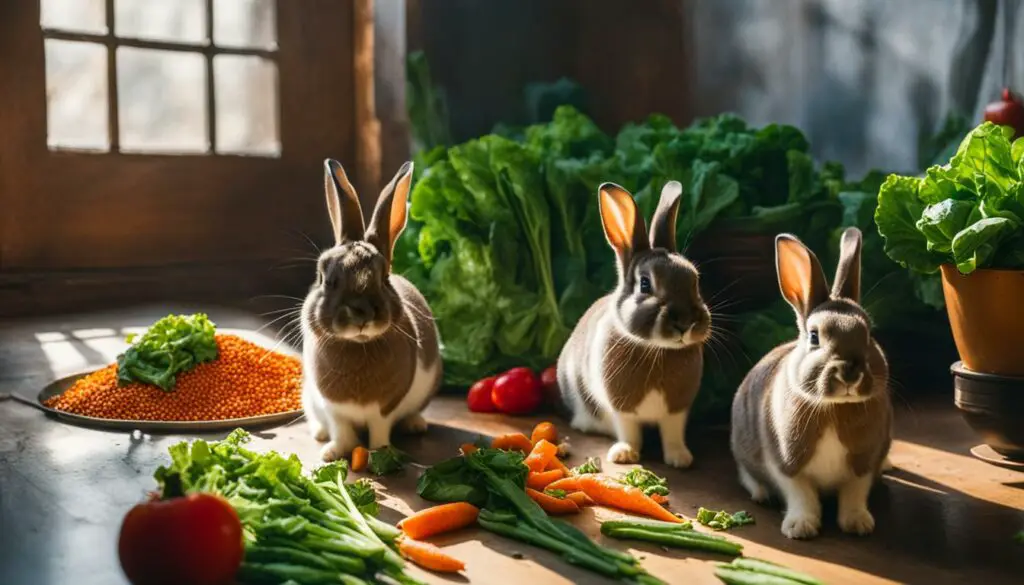
Fresh Fruit as a Treat
Rabbits can enjoy fresh fruit as a delicious treat in moderation. Fruits provide a sweet and flavorful addition to their diet, but it’s important not to overdo it as they are high in calories. I recommend offering about 2 tablespoons of fresh fruit daily to a mature adult rabbit weighing around 6 pounds. This amount can be adjusted based on the size and individual needs of your rabbit.
When it comes to choosing rabbit-friendly fruits, there are several options to consider. Apples, cherries, pears, peaches, plums, kiwi, papaya, mango, berries, and melons are all safe choices. However, it’s essential to remove any seeds, pits, or peels that may be harmful to your rabbit. These can pose a choking hazard or contain substances that are toxic to rabbits.
“Fruit treats marketed specifically for rabbits in pet stores are generally unnecessary and can be high in carbohydrates or sugar.”
It’s important to remember that fresh fruit should only make up a small portion of your rabbit’s overall diet. The majority of their nutrition should come from hay and fresh vegetables. By offering fruit as an occasional treat, you can provide your rabbit with a tasty reward while still maintaining a balanced and healthy diet.
As an alternative treat, you can also offer twigs from apple or willow trees. These natural chews can help satisfy your rabbit’s chewing instincts while providing additional enrichment.
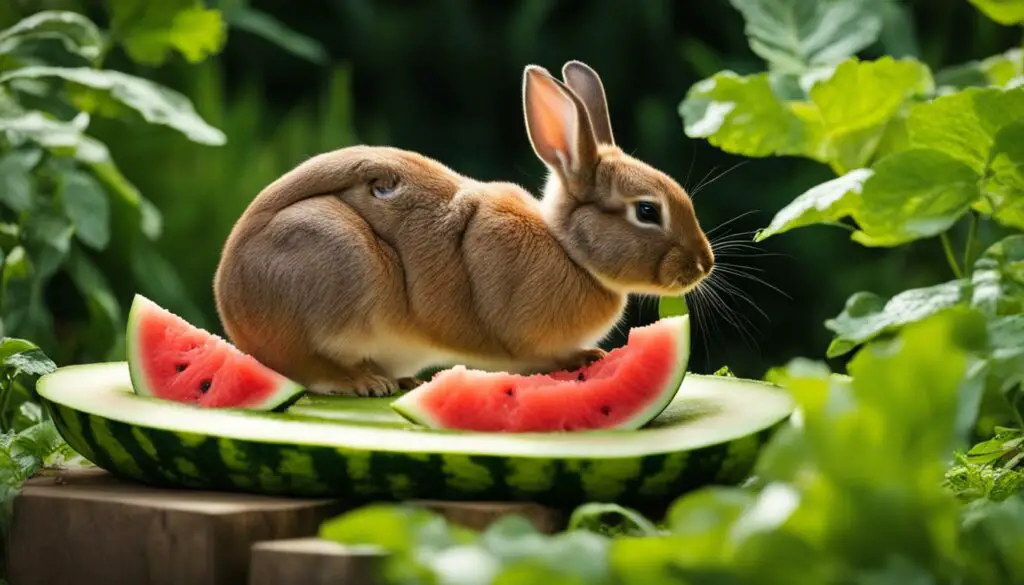
Grass Hay as the Foundation
I cannot overstate the importance of grass hay in a rabbit’s diet. It serves as the foundation for their overall health and well-being. Grass hay, such as timothy, orchard, oat, and botanical hay, is rich in essential nutrients and fiber. It supports a healthy gastrointestinal tract, aids in proper digestion, and helps prevent dental issues by promoting natural chewing and wearing down of their teeth. Grass hay should be made available at all times for rabbits to graze on.
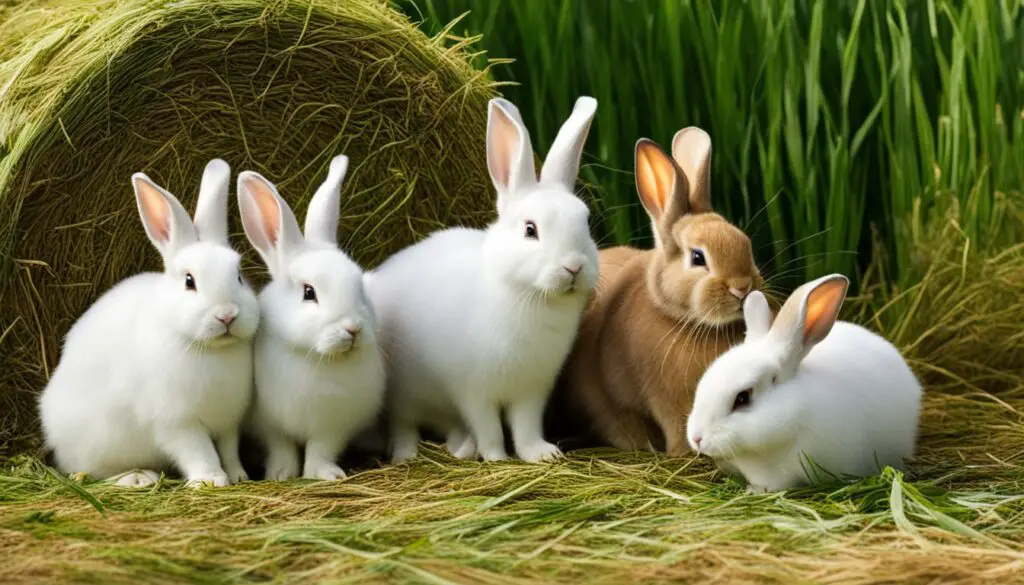
Grass hay provides a multitude of benefits to rabbits. It not only promotes dental health and gastrointestinal motility but also helps prevent obesity by providing a low-calorie, high-fiber option. The rough texture of the hay aids in wearing down the constantly growing teeth of rabbits. Additionally, the high fiber content of grass hay helps to prevent hairballs and other digestive issues. It is a crucial component of their diet and should be the primary source of nutrition for rabbits.
Feeding rabbits grass hay is not only essential for their well-being but also a natural and enjoyable part of their daily routine. Rabbits love to graze and nibble on hay, mimicking their natural behavior in the wild. It provides mental stimulation and keeps them physically active. By offering a variety of grass hay options, you can add variety to their diet and keep them interested and engaged.
The Role of Vegetables in a Rabbit’s Diet
Vegetables play a vital role in a rabbit’s diet, providing essential nutrients and hydration. Dark leafy greens should make up the majority of a rabbit’s vegetable intake, with other vegetables like bell peppers, cucumbers, parsnips, and celery offered in smaller quantities. These vegetables are packed with vitamins, minerals, and antioxidants that support overall health and well-being. Including a variety of vegetables in a rabbit’s diet not only provides nutritional diversity but also adds different textures and flavors to their meals, keeping them engaged and satisfied.
Incorporating vegetables into a rabbit’s diet should be done gradually, starting at or older than 12 weeks of age. Begin with small quantities of one vegetable at a time, and monitor the rabbit’s digestion for any signs of diarrhea or other adverse reactions. As the rabbit adjusts to the new additions, gradually increase the variety and amount of vegetables offered. This helps ensure a balanced diet and minimizes the risk of digestive upset.
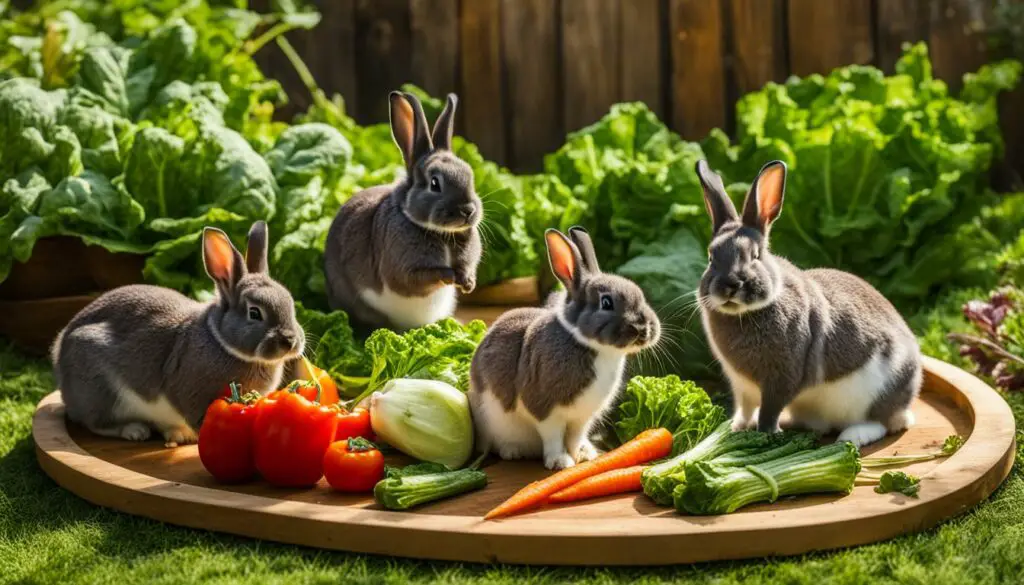
When selecting vegetables for a rabbit’s diet, it’s important to choose options that are safe and beneficial for them. Avoid vegetables high in starch or sugar, as they can disrupt the delicate balance of a rabbit’s digestive system. Aim for a mix of leafy greens and non-leafy vegetables to provide a range of nutrients. Leafy greens like lettuce, arugula, and dandelion greens are excellent choices. Non-leafy vegetables such as bell peppers, cucumbers, and broccoli can be given in smaller quantities. By offering a diverse array of vegetables, rabbits can enjoy a healthy and well-rounded diet.
Pellets and Their Role in Rabbit Nutrition
When it comes to a rabbit’s diet, pellets play an important role in providing essential nutrients. However, it’s crucial to understand that pellets should not be the main component of their diet. Instead, they should be seen as a supplement to a balanced meal plan that includes fresh vegetables and grass hay. Pellets are designed to meet specific nutritional needs, and their composition can vary among brands. It’s important to choose high-quality pellets with a fiber content of at least 18%, a protein content between 12% and 14%, and low calcium levels to prevent urinary tract problems.
Rabbits have different dietary requirements depending on their age, size, and activity level. The amount of pellets to feed should be regulated based on the weight of the rabbit. The House Rabbit Society provides guidelines for pellet quantities, which can be adjusted as the rabbit matures. For baby rabbits, pellets can be offered free-choice until around 6 months of age when they should be gradually reduced. Adult rabbits should receive a measured amount of pellets, typically about 1/4 cup per 6 pounds of body weight per day. It’s essential to monitor the rabbit’s weight and adjust the pellet quantity accordingly to maintain a healthy balance.
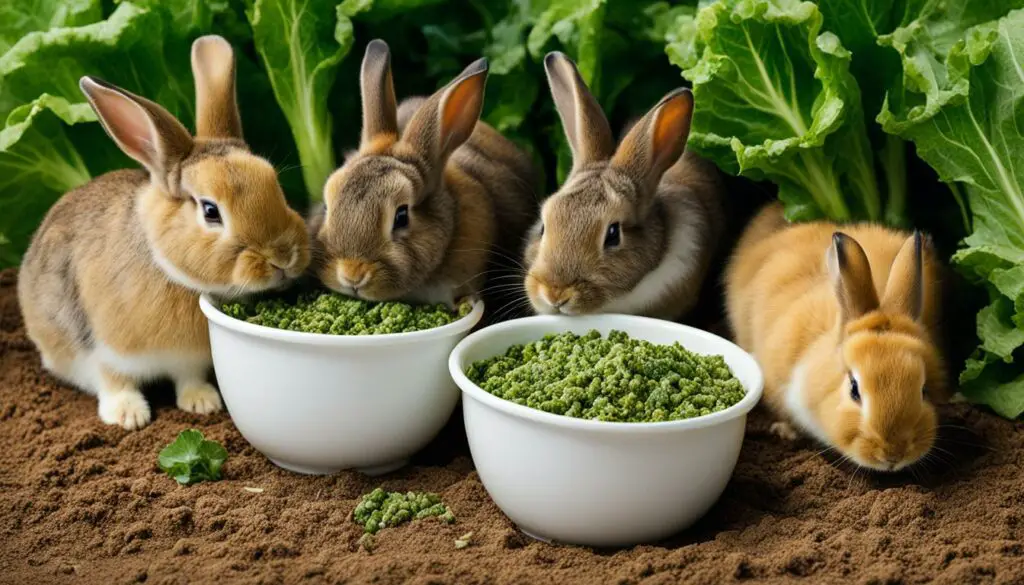
Pellets – A Part of a Balanced Diet
Pellets should not be the sole source of nutrition for rabbits. The foundation of their diet should be grass hay, which is rich in fiber and essential for their digestive health. Hay should be provided at all times to ensure proper digestion and prevent gastrointestinal problems. Fresh vegetables are also an essential component of a rabbit’s diet, providing them with additional vitamins, minerals, and hydration. Leafy greens should make up about 75% of the fresh portion of their diet, while non-leafy vegetables should be limited to around 15%. Fruit can be offered as an occasional treat, making up no more than 10% of their overall diet.
Rabbits have specific dietary needs, and it’s crucial to provide them with a variety of foods to meet those needs. Alongside pellets, a balanced diet that includes hay and fresh vegetables will contribute to their overall health and well-being. It’s important to consult with a veterinarian to determine the optimal diet for your individual pet rabbit and to ensure that they receive all the nutrients necessary for a happy and healthy life.
Fruit as an Occasional Treat
In addition to hay and fresh vegetables, fruit can be offered to rabbits as an occasional treat. While fruits are tasty and appealing to rabbits, it’s important to remember that they should only make up a small portion of their overall diet. Feeding rabbits too much fruit can lead to weight gain and other health issues, so it’s best to offer it in moderation.
Some rabbit-friendly fruits that can be enjoyed by your furry friend include apples, cherries, pears, peaches, plums, kiwi, papaya, mango, berries, and melons. These fruits are not only delicious but also provide essential vitamins and minerals that contribute to your rabbit’s overall health.
When offering fruits to your rabbit, it’s crucial to remove any seeds, pits, or peels that may be harmful. These parts can pose a choking hazard or contain toxins that are not safe for your rabbit to consume. By removing these parts, you can ensure that your rabbit can enjoy their fruit treat safely and without any risks.
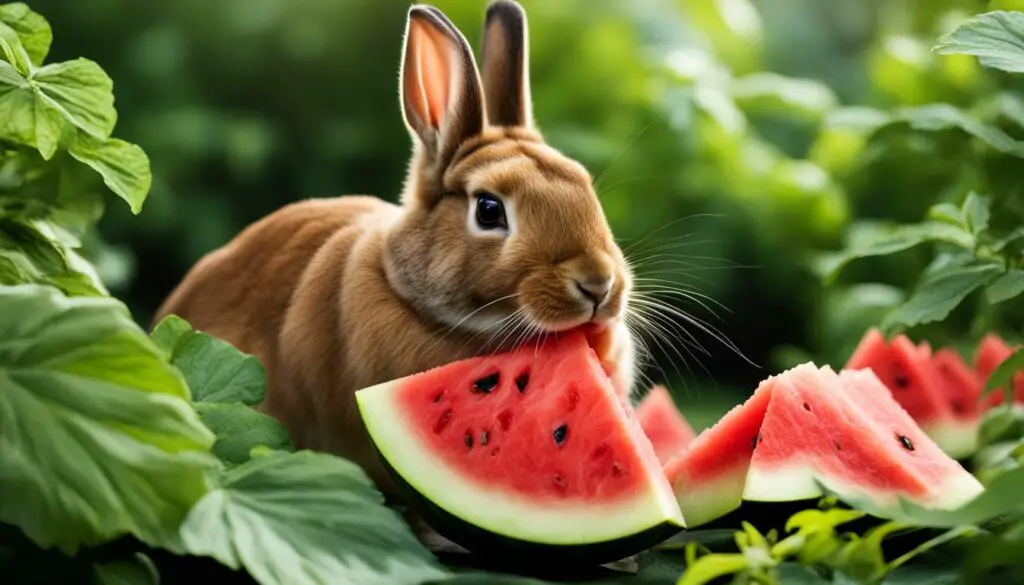
The Benefits of Offering Fruit as a Treat
“Fruit can be a great way to provide enrichment and variety in a rabbit’s diet. It can also be used as a training tool or a way to bond with your pet.”
Offering fruits as occasional treats can have several benefits for your rabbit. Firstly, providing fruit can serve as an enrichment activity, adding variety to their diet and stimulating their senses. The different textures, flavors, and scents of fruits can provide mental stimulation for your rabbit.
Additionally, fruits can be used as a training tool to reward good behavior or to encourage your rabbit to learn new tricks. By using small pieces of fruit as a treat, you can positively reinforce desired behaviors and strengthen the bond between you and your furry friend.
However, it’s important to remember that fruits should only be given in small amounts due to their high sugar content. While rabbits can enjoy the occasional fruit treat, their diet should primarily consist of hay, fresh vegetables, and a small portion of pellets to ensure they receive the necessary nutrients for optimal health.
The Benefits of Fresh Greens and Veggies for Rabbits
Fresh greens and veggies play a crucial role in a rabbit’s diet, providing numerous benefits for their overall health and well-being. These plant-based foods are rich in essential vitamins, minerals, antioxidants, and fiber, making them an excellent addition to a rabbit’s daily meals. Incorporating a variety of fresh greens and veggies into their diet can provide rabbits with a range of nutrients necessary for their optimal health.
One of the key benefits of fresh greens and veggies for rabbits is their high nutritional value. Dark leafy greens, such as lettuce, arugula, and turnip greens, are particularly rich in vitamins A, B, C, and K. These vitamins are essential for maintaining good vision, healthy skin, a strong immune system, and proper blood clotting. Additionally, fresh greens and veggies provide soluble fiber, which helps to regulate digestion and prevent gastrointestinal issues in rabbits.
Fresh greens and veggies also offer hydration to rabbits, as they have a high water content. This can be particularly beneficial during hot weather or for rabbits who may have difficulty staying adequately hydrated. Furthermore, these plant-based foods provide mental and nutritional enrichment for rabbits, stimulating their natural foraging and chewing behaviors. This can help to prevent boredom and ensure they receive a well-rounded and satisfying diet.
Quote: “Including a variety of fresh greens and veggies in a rabbit’s diet can help keep them healthy and happy.” – Rabbit Nutrition Expert
Overall, incorporating fresh greens and veggies into a rabbit’s diet provides a range of benefits, including essential nutrients, hydration, and mental stimulation. It is important to introduce new foods gradually and monitor the rabbit’s response to ensure they tolerate them well. As always, consult with a veterinarian to determine the optimal diet for your individual pet rabbit and provide them with a balanced and nutritious meal plan.
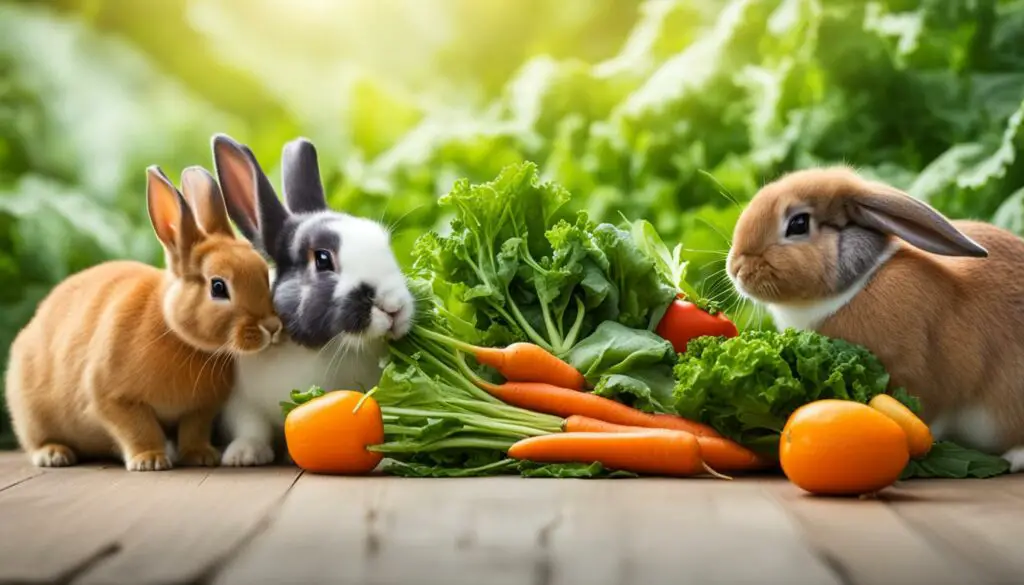
Table: Nutritional Benefits of Common Fresh Greens and Veggies for Rabbits
| Food | Vitamin Content | Mineral Content | Other Benefits |
|---|---|---|---|
| Lettuce | Vitamin A, K | Iron, Potassium | Hydration, Digestive health |
| Arugula | Vitamin A, C, K | Calcium, Iron | Antioxidants, Digestive health |
| Turnip Greens | Vitamin A, C, K | Calcium, Magnesium | Bone health, Digestive health |
| Bell Peppers | Vitamin C | Potassium, Folate | Antioxidants, Immune function |
| Cucumbers | Vitamin K | Potassium, Magnesium | Hydration, Skin health |
Appropriate Greens and Veggies for Rabbits
Rabbits can enjoy a variety of fresh greens and veggies as part of their balanced diet. These foods provide essential nutrients, hydration, and enrichment for your furry friend. When selecting greens for your rabbit, consider options like lettuce, arugula, turnip greens, dandelion greens, basil, mint, and watercress. These leafy greens are packed with vitamins and minerals that contribute to optimal rabbit health.
Non-leafy vegetables can also be included in your rabbit’s diet, though in smaller quantities. Some examples of rabbit-friendly non-leafy veggies include bell peppers, cucumbers, broccoli, brussel sprouts, and cabbage. These veggies provide additional variety and texture to your rabbit’s meals, ensuring they receive a diverse range of nutrients.
Remember to introduce new foods gradually and monitor your rabbit’s response. Each rabbit may have individual health factors that need to be considered when selecting greens and veggies for their diet. By offering a combination of appropriate greens and veggies, you can provide a well-rounded diet that supports your rabbit’s overall well-being.
| Appropriate Greens | Appropriate Veggies |
|---|---|
| Lettuce | Bell Peppers |
| Arugula | Cucumbers |
| Turnip Greens | Broccoli |
| Dandelion Greens | Brussel Sprouts |
| Basil | Cabbage |
| Mint | |
| Watercress |
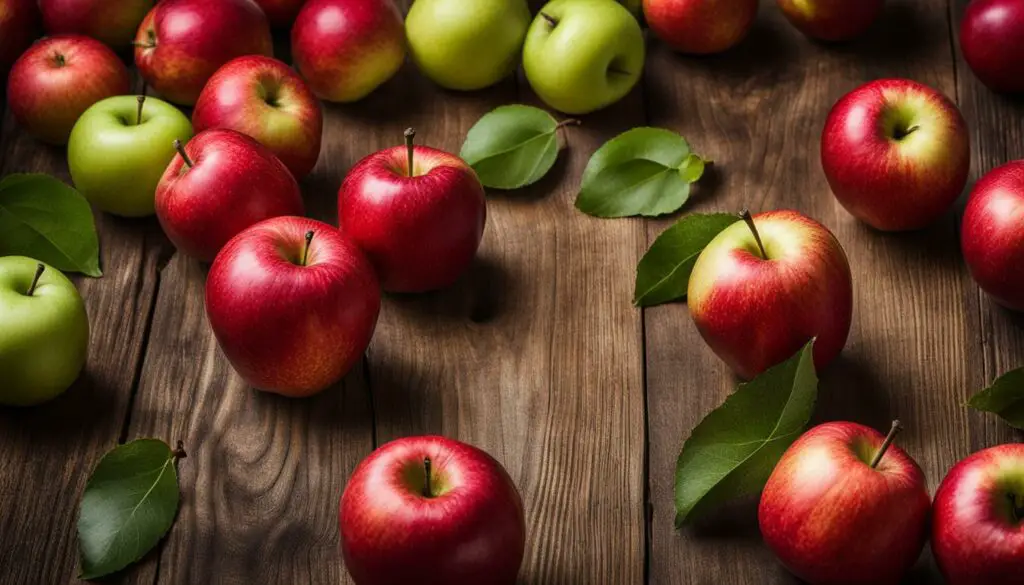
By offering a balanced combination of appropriate greens and veggies, you can ensure that your rabbit receives a nutritious and enjoyable diet. Remember to consult with a veterinarian to determine the optimal diet for your individual pet rabbit based on their specific needs and health considerations.
Conclusion
In conclusion, providing an optimal diet for rabbits is essential for their overall health and well-being. The foundation of a rabbit’s diet should be grass hay, such as timothy, orchard, or oat hay, which provides necessary nutrients, promotes dental health, and supports a healthy gastrointestinal tract. Fresh vegetables, including leafy greens like mustard greens, should make up a significant portion of a rabbit’s diet. These greens provide essential vitamins, minerals, and hydration, while adding variety and mental enrichment to their meals.
It is important to introduce new foods gradually and monitor the rabbit’s response. Each rabbit may have individual health factors that need to be considered when selecting greens and veggies. Additionally, a small portion of pellets can be included in the diet to provide additional nutrients, but their quantity should be regulated to prevent obesity and nutrient imbalances. Fruits can also be offered as occasional treats, but their intake should be limited to prevent weight gain and digestive issues.
Consulting with a veterinarian is highly recommended to ensure the optimal diet for your individual pet rabbit. They can provide guidance on portion sizes, dietary restrictions based on the rabbit’s health condition, and any specific nutritional requirements. By providing a balanced and varied diet, we can help rabbits lead healthy and happy lives.
FAQ
Can rabbits eat mustard greens?
Yes, mustard greens are safe for rabbits to eat and can be incorporated into their diet as part of the fresh foods portion.
What is the importance of hay in a rabbit’s diet?
Hay is the most important part of a rabbit’s diet as it provides essential nutrients, promotes healthy teeth, and helps maintain a healthy gastrointestinal tract.
What vegetables are suitable for rabbits?
Rabbit-friendly vegetables include parsley, spinach, beet greens, Swiss chard, and radish tops, among others.
Can rabbits eat fruits?
Yes, rabbits can eat fruits in moderation as a treat, with options like apples, cherries, pears, peaches, plums, kiwi, and melons.
Are there any concerns about certain substances in a rabbit’s diet?
Some vegetables, like parsley, mustard greens, and spinach, contain relatively high levels of oxalic acid and should be fed in moderation to avoid potential health issues.
Can vegetables cause gas or goiter in rabbits?
While some vegetables can cause gastrointestinal gas in humans, a rabbit’s digestive system is different, and many of these foods do not cause gas in rabbits. Concerns about goitrogenic foods causing goiter in rabbits are generally unfounded when fed in moderate amounts.
What is the recommended diet for a rabbit?
A balanced rabbit diet should include hay as the foundation, along with fresh vegetables and a few pellets. Fruits should be offered as occasional treats.
How much hay should a rabbit eat?
Grass hay, such as timothy, orchard, and oat hay, should make up the majority of a rabbit’s diet and should be available at all times for them to eat.
What role do vegetables play in a rabbit’s diet?
Vegetables provide essential nutrients and hydration for rabbits and should make up a significant portion of their diet, along with hay and a few pellets.
How much fruit should a rabbit eat?
Fruits should make up no more than 10% of a rabbit’s overall diet and should be offered in small amounts as occasional treats.
What are the benefits of fresh greens and veggies for rabbits?
Fresh greens and veggies provide essential vitamins, minerals, antioxidants, and hydration for rabbits, promoting overall health and well-being.
What greens and veggies are appropriate for rabbits?
Leafy greens like lettuce, arugula, turnip greens, and dandelion greens, as well as non-leafy vegetables like bell peppers, cucumbers, and broccoli, are suitable for rabbits.
How much pellets should a rabbit eat?
The amount of pellets to feed depends on the weight of the rabbit, with guidelines provided by the House Rabbit Society. Pellets should be restricted to prevent obesity and nutrient imbalances.
Can rabbits eat dried fruits?
Dried fruits should be fed in even smaller amounts than fresh fruits due to their concentrated nature.
Source Links
- https://rabbit.org/care/fruits-vegetables/
- https://www.thesprucepets.com/what-to-feed-rabbits-1237194
- https://oxbowanimalhealth.com/blog/what-are-the-best-vegetables-and-leafy-greens-for-rabbits/

